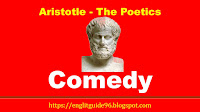Aristotle - The Poetics
Aristotle (384-322, B. C.) was born at
Stagira, in Macedon, where his father was physician to the king Amynats II. He
studied under Plato for twenty years. Then after a period of twelve years, he
was appointed by Philip of Macedon, tutor to the future Alexander the great in
342 and seven years later he returned to Athens where he opened a school in the
Lyceum grove outside the city. His works are believed to cover logic, ethics,
metaphysics, physics, zoology, politics and poetics. Aristotle’s Poetics came
into prominence in the middle of the 16th century and contributed to the rise
of neoclassicism. It has left its mark on the critical writings of Sydney,
Dryden and Dr. Johnson.
Aristotle
is believed to have written nearly half a dozen critical treatises, of which
only two are extant—Poetics and Rhetoric, the former dealing with the art of
poetry and the latter with the art of speaking. Poetics, however, deals with
many more problems than Rhetoric and has therefore attracted greater attention
than the latter. He leaves the reader to the nature and purpose of Poetics. The
conclusions of Poetics are firmly rooted in the Greek Literature, and are
illustrated from it. His approach is the scientific one of observation and analysis.
Many of Aristotle’s conclusions on the nature of poetry and drama are of
general application and are as true today as they were in his own day. His
purpose in writing Poetics and Rhetoric was to sort out those principles, from
established practice, that made for a good poet and a good orator.
Views
on Poetry: Plato
Plato,
the teacher of Aristotle, provides the basis upon which Aristotle’s theory of poetry
flourishes. Plato, the most celebrated disciple of Socrates, holds in the
Republic ‘Ideas are the ultimate reality’. Things are conceived as ideas before
they take practical shape as things. For example, a tree is nothing more than a
concrete embodiment of its image in idea. The idea of everything therefore is
its original pattern and thing itself is copy. As copy ever falls short of the
original, it is once removed from reality. Now art—literature, painting, sculpture-
reproduces but things ‘as mere pastime’, the first in words, the next in colors
and the last in stone. So, it merely copies a copy: it is twice removed from
reality. He was perhaps, the first to see that all art is imitation, imitating
the objects of life or Nature, and that there are two kinds of art-the fine
arts, like literature, painting, sculpture and music and the useful arts like
medicine, agriculture and cookery.
This
naturally leads Plato to consider the function of poetry. Although it pleases,
mere pleasure, he says, cannot be its object. Everywhere therefore he suggests
truth as the test of poetry: what contribution it makes to the knowledge of
virtue. Only in this way it could mold character and promote the interests of
the state. Pleasure, even of the highest kind, ranks low in Plato’s scale of
value. A poet is a good artist only in so far as he is a good teacher. He says,
Poetic truth must be the highest truth- ideal forms of justice, goodness,
beauty and the like.
Views
on Poetry: Aristotle
Aristotle
was the most distinguished disciple of Plato who refuted the charges framed by
his teacher, Plato very politely. Like Plato too, he believes that there is a
natural pleasure in imitation which is an inborn instinct in man, constituting
the one difference between him and the lower animals. It is this pleasure in
imitation that enables the child to learn his earliest lessons in speech and
conduct from those around him. They are imitated by him because there is
pleasure in doing so. A poet or an artist is just a grown-up child indulging in
imitation for the pleasure it affords. But the poet’s imitations or picture of
life are not unreal- ‘twice removed from reality’- as Plato believed. On the
contrary, they reveal truths of a permanent or universal kind. To prove this
Aristotle institutes a comparison between poetry and history. It is not the
function of the poet to relate what has happened, but what may happen-what is
possible according to the law of probability or necessity. The poet and the
historian differ not by writing in verse or in prose. The true difference is
that one relates what has happened, the other what may happen.
Poetry
is a more philosophical and a higher thing than history: for poetry tends to express
the universal, history the particular. History records particular persons,
places or things: poetry infuses a universal appeal into them by stressing what
they have in common with all persons, all places or all things.
Each
kind of poetry carries with it a distinctive pleasure. A tragic vision has an
inherent capacity of calling forth pity and fear; this quality must be
impressed by the poet on the dramatic material.






















0 Comments